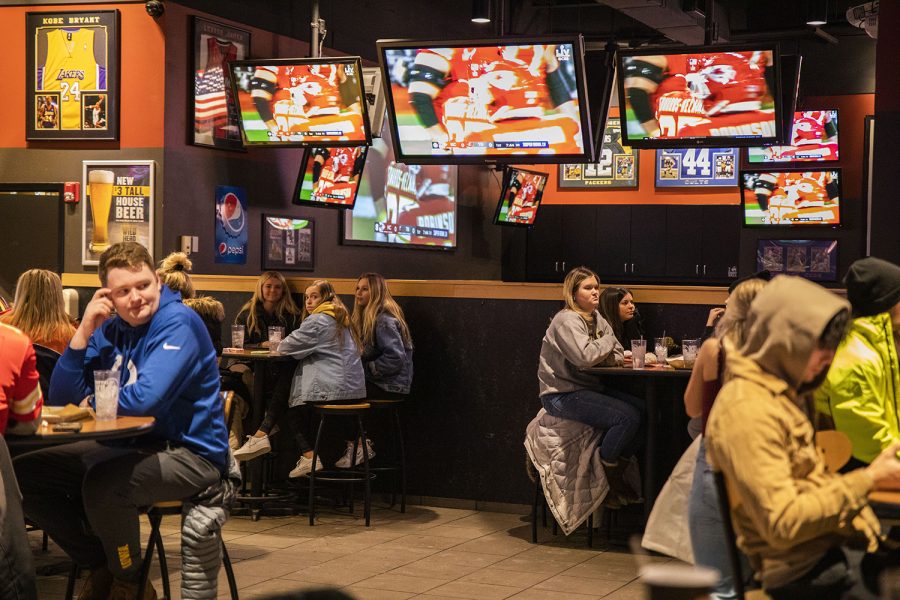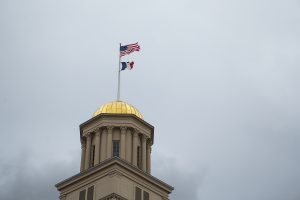Iowa City leaders, University of Iowa professors, express concern at end of state-wide mask mandate
Iowa City professionals and university professors are cautioning Iowans to continue practicing social distancing and wearing masks.
Tables are kept 6 feet apart at Buffalo Wild Wings during the Super Bowl on Sunday, Feb. 7, 2021. Social distancing is still maintained after Governor Kim Reynolds removed the mandate at 12:01 a.m. that morning. (Jeff Sigmund/Daily Iowan)
February 10, 2021
Iowa City community members are expressing concern for their health and safety after Gov. Kim Reynolds relaxes COVID-19 restrictions statewide.
On Feb. 5, Reynolds introduced a new Public Health Disaster proclamation that lifted COVID-19 protocols following a steady decrease in state cases. Bars, restaurants, and other businesses are now no longer required to enforce social distancing and face coverings.
Despite vaccine rollout and an overall drop in illness, Iowa reported 615 positive cases and 101 related deaths on Feb. 5 alone.
Citizens of Iowa City have been critical of Reynolds’ decision, with many cities within Johnson County announcing that their health and safety guidelines will remain in place.
Iowa City Mayor Bruce Teague will not modify the city’s COVID-19 precautions in light of Reynolds’ statement. The existing mandate requires social distancing and face coverings in public spaces until May 31, unless otherwise extended.
RELATED: Iowa City Mayor issues proclamation requiring masks in public
University of Iowa sophomore Laney Muntz said she supports Teague’s governance and decision to continue the city’s mask mandate.
“I think that it is a good and responsible choice to keep the mandate in Iowa City as long as possible,” Muntz said.
Muntz said she has been critical of Reynolds’ leadership throughout the entirety of the pandemic, especially after Reynolds implemented the statewide mask requirement on Nov. 17, nearly four months after Iowa City mandate on July 21.
“I was surprised when she put a state-wide mandate in place at all because it took so incredibly long,” Muntz said. “I feel like Reynolds’ reaction has been extremely reactive instead of proactive this entire time.”
RELATED: Gov. Kim Reynolds announces stronger mask requirements nine months into pandemic
Coralville Mayor John Lundell said in a press release on Monday that the city would continue to have a mask mandate until April 15. Citizens will be expected to adhere to social distancing guidelines during that time.
Despite Iowa City’s preventative measures, the statewide proclamation from Reynolds has University of Iowa professionals worried about the health of Iowans.
UI Professor in the Department of Occupational and Environmental Health Fredric Gerr said he predicts the state to foresee an influx of COVID-19 infections without preventative measures in place.
“The elimination of the requirement to wear face coverings in public is anticipated to result in a greater number of COVID-19 infections than would have occurred if face coverings were required,” Gerr said. “Every one of these restrictions that has been lifted are useful and important for the potential for the health of the people of Iowa.”
Gerr emphasized the need to limit non-essential interactions, continue the practice of social distancing, and to wear face coverings in all public spaces.
Johnson County Community Health Manager Sam Jarvis said he is also troubled by Reynolds’ decision.
“This is certainly not the way we want things to go,” said Jarvis. “The suspension of those mitigation measures puts our community at risk while the pandemic is still going on.”
On Feb. 6, Johnson County Public Health released a statement encouraging people to continue wearing masks.
“The suspension of mitigation measures by the governor puts our community at risk while the pandemic is still occurring. It is still too soon to determine when it will be safe for people to stop wearing masks and avoiding close contact with others,” the statement said.
Face coverings and social distancing are currently mandated in the county until Feb. 19, according to the statement.
Jarvis said he echoes the statement and encourages community members to continue practicing COVID-19 protocol.
“We have to reiterate how important those measures are and recognize that they need to continue to occur throughout the rest of the pandemic until we learn otherwise, and as of right now that has yet to be seen,” Jarvis said.






